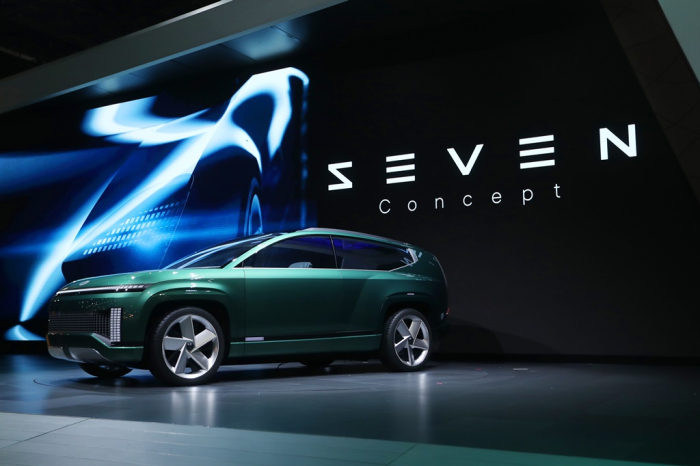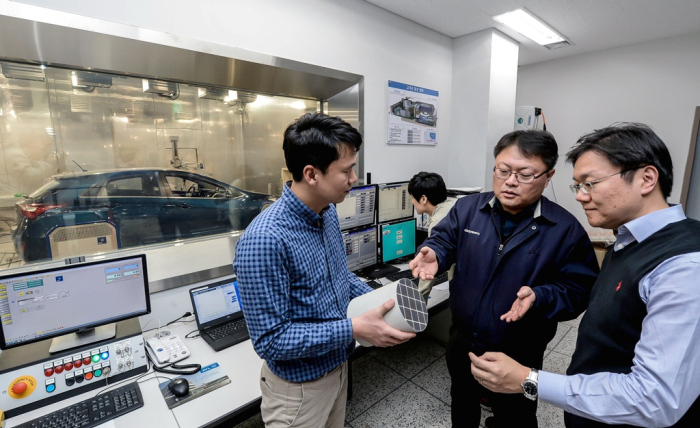Electric vehicles
Hyundai Motor closes engine development division
S. Korean automaker converted teams for powertrain into EV development units
By Dec 23, 2021 (Gmt+09:00)
3
Min read
Most Read
LG Chem to sell water filter business to Glenwood PE for $692 million


KT&G eyes overseas M&A after rejecting activist fund's offer


Kyobo Life poised to buy Japan’s SBI Group-owned savings bank


StockX in merger talks with Naver’s online reseller Kream


Meritz backs half of ex-manager’s $210 mn hedge fund



Hyundai Motor Group, South Korea’s top automaker, will stop developing new internal combustion engines in order to accelerate its transformation into an electric vehicle manufacturer.
Hyundai Motor Co., the group’s larger carmaker, closed its engine development division at its research and development center, according to industry sources on Dec. 23. The Namyang R&D Center in South Korea is the group’s brain with about 12,000 researchers.
“Now, it is inevitable to convert into electrification,” said the newly appointed R&D chief Park Chung-kook in an email to employees. “Our own engine development is a great achievement, but we must change the system to create future innovation based on the great asset from the past.”
The move came as the global automobile industry is moving towards EVs more rapidly than expected. An EV, which runs on an electric motor, does not need a powertrain, which includes an internal combustion engine and a transmission.
The engine development team was established in 1983 as the late Chung Ju-yung, Hyundai Group founder and grandfather of current Hyundai Motor Group Chairman Chung Euisun, ordered that the company make its own engine.
Hyundai Motor in 1991 unveiled the Alpha engine, its first own product, and later showcased its successors such as the Beta, the Theta and the Nu engines that helped Hyundai Motor Group rise to its position among the world’s top five automakers.
FOCUS ON EV
But Hyundai Motor shut down the engine development division this month after about 40 years to enhance its EV development division.
Hyundai Motor has converted its teams focusing on the powertrain, which creates power from the engine and delivers it to the wheels on the ground, into units for electrification development. In the past, the EV development units were under the powertrain development units.
Researchers at the engine design unit have moved to the electrification design center, leaving only some to modify existing engines. The powertrain system development center is transforming into an electrification test center, while the powertrain performance development center is becoming an electrification performance development center.

At the same time, it has established a battery development center under the electrification development division to secure advanced battery technology, the core competitiveness in EVs. The center has teams for battery design, battery performance development and others.
HIGHER EV SALES TARGET
Hyundai Motor President & CEO Chang Jae-hoon has recently said the company would take aggressive steps to transform into an EV producer as quickly as possible.
Hyundai Motor and Kia Corp. unveiled a target to sell 1.7 million EVs worldwide in 2026, higher than 1 million units in 2025, given the rapid growth in the global EV market.
EVs are predicted to dominate the global market before 2030, compared to forecasts made in 2020 that the eco-friendly automobiles had been expected to account for half of new car sales in 2040.
“The immediate task is to develop innovative vehicles that can dominate the future market,” Park said. “This reorganization will be an important starting point for change ahead in the new year."
In addition, the R&D Center will also focus on raw materials for batteries and semiconductors since they are expected to become more important alongside growth in the global EV and autonomous vehicle markets.
The company streamlined the R&D center by combining project management teams and product integration development teams to accelerate EV development.
Write to Byung-Uk Do and Il-Gue Kim at dodo@hankyung.com
Jongwoo Cheon edited this article.
More to Read
-
 Executive reshufflesHyundai Motor overhauls management in biggest-ever generational revamp
Executive reshufflesHyundai Motor overhauls management in biggest-ever generational revampDec 17, 2021 (Gmt+09:00)
3 Min read -
 Electric vehiclesHyundai Motor to launch six EV models in India by 2028
Electric vehiclesHyundai Motor to launch six EV models in India by 2028Dec 08, 2021 (Gmt+09:00)
1 Min read -
 Electric vehiclesHyundai Motor to debut IONIQ7 concept in November LA auto show
Electric vehiclesHyundai Motor to debut IONIQ7 concept in November LA auto showNov 04, 2021 (Gmt+09:00)
1 Min read -

-
 Electric vehiclesGenesis goes green as Hyundai Motor accelerates EV push
Electric vehiclesGenesis goes green as Hyundai Motor accelerates EV pushSep 02, 2021 (Gmt+09:00)
3 Min read
Comment 0
LOG IN


